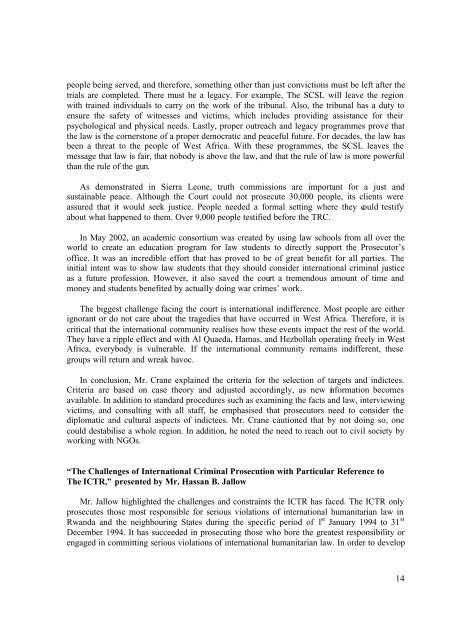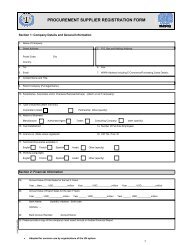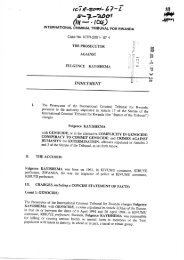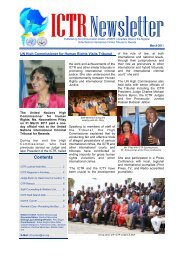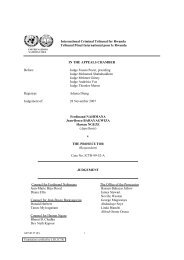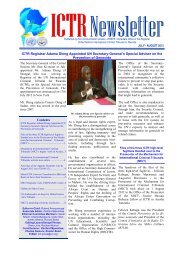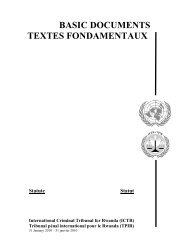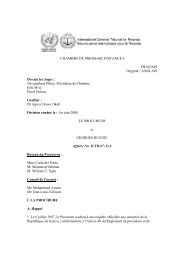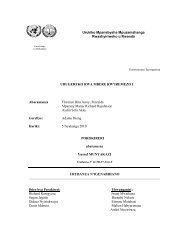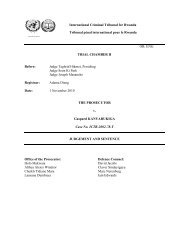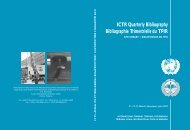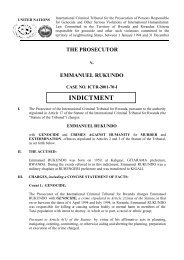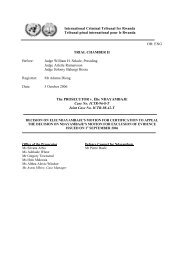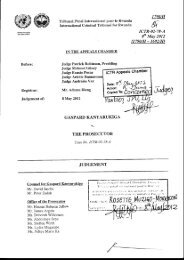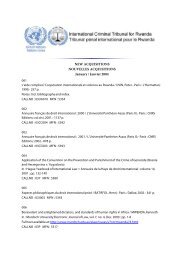Report of Proceedings - International Criminal Tribunal for Rwanda
Report of Proceedings - International Criminal Tribunal for Rwanda
Report of Proceedings - International Criminal Tribunal for Rwanda
You also want an ePaper? Increase the reach of your titles
YUMPU automatically turns print PDFs into web optimized ePapers that Google loves.
people being served, and there<strong>for</strong>e, something other than just convictions must be left after the<br />
trials are completed. There must be a legacy. For example, The SCSL will leave the region<br />
with trained individuals to carry on the work <strong>of</strong> the tribunal. Also, the tribunal has a duty to<br />
ensure the safety <strong>of</strong> witnesses and victims, which includes providing assistance <strong>for</strong> their<br />
psychological and physical needs. Lastly, proper outreach and legacy programmes prove that<br />
the law is the cornerstone <strong>of</strong> a proper democratic and peaceful future. For decades, the law has<br />
been a threat to the people <strong>of</strong> West Africa. With these programmes, the SCSL leaves the<br />
message that law is fair, that nobody is above the law, and that the rule <strong>of</strong> law is more powerful<br />
than the rule <strong>of</strong> the gun.<br />
As demonstrated in Sierra Leone, truth commissions are important <strong>for</strong> a just and<br />
sustainable peace. Although the Court could not prosecute 30,000 people, its clients were<br />
assured that it would seek justice. People needed a <strong>for</strong>mal setting where they could testify<br />
about what happened to them. Over 9,000 people testified be<strong>for</strong>e the TRC.<br />
In May 2002, an academic consortium was created by using law schools from all over the<br />
world to create an education program <strong>for</strong> law students to directly support the Prosecutor’s<br />
<strong>of</strong>fice. It was an incredible ef<strong>for</strong>t that has proved to be <strong>of</strong> great benefit <strong>for</strong> all parties. The<br />
initial intent was to show law students that they should consider international criminal justice<br />
as a future pr<strong>of</strong>ession. However, it also saved the court a tremendous amount <strong>of</strong> time and<br />
money and students benefited by actually doing war crimes’ work.<br />
The biggest challenge facing the court is international indifference. Most people are either<br />
ignorant or do not care about the tragedies that have occurred in West Africa. There<strong>for</strong>e, it is<br />
critical that the international community realises how these events impact the rest <strong>of</strong> the world.<br />
They have a ripple effect and with Al Quaeda, Hamas, and Hezbollah operating freely in West<br />
Africa, everybody is vulnerable. If the international community remains indifferent, these<br />
groups will return and wreak havoc.<br />
In conclusion, Mr. Crane explained the criteria <strong>for</strong> the selection <strong>of</strong> targets and indictees.<br />
Criteria are based on case theory and adjusted accordingly, as new in<strong>for</strong>mation becomes<br />
available. In addition to standard procedures such as examining the facts and law, interviewing<br />
victims, and consulting with all staff, he emphasised that prosecutors need to consider the<br />
diplomatic and cultural aspects <strong>of</strong> indictees. Mr. Crane cautioned that by not doing so, one<br />
could destabilise a whole region. In addition, he noted the need to reach out to civil society by<br />
working with NGOs.<br />
“The Challenges <strong>of</strong> <strong>International</strong> <strong>Criminal</strong> Prosecution with Particular Reference to<br />
The ICTR,” presented by Mr. Hassan B. Jallow<br />
Mr. Jallow highlighted the challenges and constraints the ICTR has faced. The ICTR only<br />
prosecutes those most responsible <strong>for</strong> serious violations <strong>of</strong> international humanitarian law in<br />
<strong>Rwanda</strong> and the neighbouring States during the specific period <strong>of</strong> 1 st January 1994 to 31 st<br />
December 1994. It has succeeded in prosecuting those who bore the greatest responsibility or<br />
engaged in committing serious violations <strong>of</strong> international humanitarian law. In order to develop<br />
14


